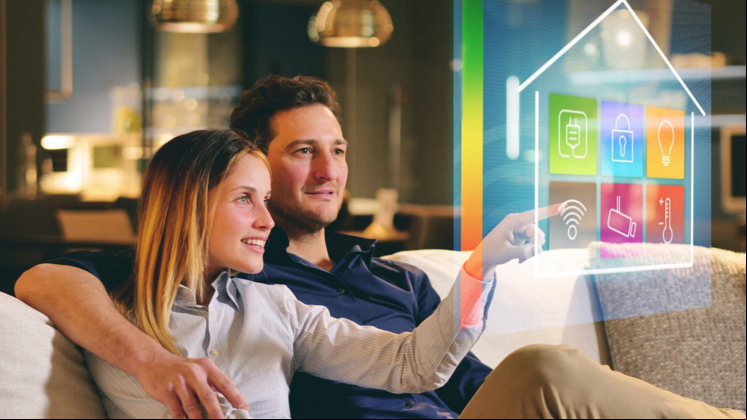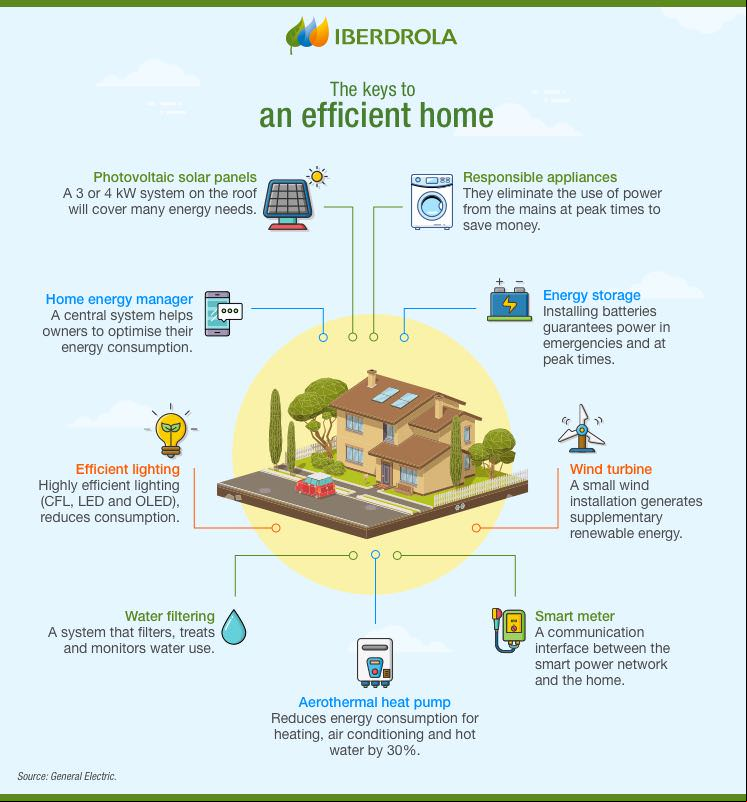Efficient houses 4y5x5t
Efficient houses. How to make your house a more sustainable one? 4c6l4z
An efficient home enables you to save energy and some methods of making these improvements such as a façade with insulating properties, windows that don't lose heat and to control water consumption are quite affordable. Let's look at how you can make your home even more environmentally friendly.

Energy efficiency entails more than just using less energy. It involves making the most of what you do use, and avoiding waste. For example, when you reduce the greenhouse gas emissions that cause climate change your efficient home is helping to fight global warming.
If you want to save energy, you need to change the habits of the people who live in the home, by turning off lights when you leave the room and stopping heat or cold from escaping through the windows. But that's not enough. To be really energy efficient, you need to make some technological improvements to the home (home automation) and change your lighting, heating and air conditioning equipment.
What is an efficient house 59633w
An efficient home is one that reduces unnecessary energy consumption, greenhouse gas emissions and the demand for non-renewable resources. At the same time, it provides more sustainable living conditions and saves significant sums of money.
Building an efficient home, or renovating a home to make it more efficient, means choosing thermal insulation materials for walls, ceilings, doors and windows, and using renewable sources of energy — such as solar s — and electricity storage systems. There are also technological solutions, like installing LED light bulbs, responsible appliances and smart control systems that optimise consumption.
Energy efficiency certificates indicate the extent to which buildings fulfil these requirements. In the European Union (EU), each country has a certification organisation that determines the level of efficiency (A, B, C and D). In the meantime, the LEED certificate gives global recognition to sustainable buildings, considering, as well as innovation and the sustainable materials and resources used in their construction factors like location and water use.
Types of efficient houses. Characteristics 61z23
Efficient homes have different names according to the construction methods used. Let's take a look at some of them:
- Energy plus houses: These houses are able to generate more electricity than they use because they have photovoltaic s that transform sunshine into electricity. In some countries, the excess electricity produced is returned to the grid.
- ive homes. The ive house or ivhaus concept consists of deg spaces, their aspect, air flow and glazed surfaces in such a way that when combined with suitable insulation, significant energy savings are possible.
- Self-sufficient homes. At the maximum level of efficiency, we have homes that at capable of generating and storing their own energy, with no need for external . This type of building needs a group of rechargeable or high performance, state-of-the-technology batteries.
Efficient homes usually have the following characteristics:
- Bioclimatic design. Bioclimatic architecture is used to adapt buildings to their local climate, considering exposure to the sun, rainfall and wind.
- Making smart use of space. An example: The proportion, volume and position of windows can save energy on both lighting and heating.
- Use of sustainable materials. Rammed earth and bioplastics are biodegradable construction materials with excellent thermal characteristics.
- Thermal insulation. The secret to energy efficiency in the home is insulation on walls, roofs and windows, allowing home owners to reduce their energy bills by up to 40%.
- Smart systems. Thermostats and smart lighting systems learn from consumer behaviour and can provide substantial savings in energy consumption.
- High-performance appliances. The heat pumps used in aerothermal systems that keep the temperature steady in the home are far more efficient that conventional boilers.
- Self-consumption. Self consumption of electricity, by installing solar s or small wind turbines can reduce or even eliminate electricity costs all together.

Tips for obtaining an efficient house 6g3am
Energy efficiency means using less energy to get the same result, but how do you do it?:
Perform an energy audit 201g3s
Analyse the highest areas of consumption and identify inefficient appliances and structures.
Install double-glazed windows 2y5n6i
Double-glazed windows capture the heat of the sun and prevent it from escaping at night.
Isolate cracks and airways 4l1w54
Poor insulation can cost extra for heating and cooling.
Adapt the house to the environment k6262
Using sunlight in winter or shade in summer can reduce air conditioning costs.
Install energy-saving lighting 3h6fb
High efficiency lamps and LED lights reduce electricity costs for lighting.
Use energy-saving appliances 5x41
The most efficient — labelled A in the EU — can consume 55% less energy than average.
Applying the rules of the 3Rs 3g3v3e
The basic rule of the circular economy is the 3Rs (reuse, recycling and reduction) and has a direct application in the construction and use of housing.
Efficient houses benefits 6t4s57
Following the above tips will make your home more efficient, which has a number of benefits:
Energy saving 19116t
Although some efficiency improvements involve a substantial outlay, the medium-term energy savings end up making them profitable.
More thermal comfort 1n6y47
Smart systems help keep the home at a comfortable temperature at a much lower cost, both in summer and winter.
Increased property value y2242
Highly energy-efficient homes reach a higher price in the real estate market.
Carbon footprint reduction gp2h
Increased efficiency reduces the carbon footprint of the home, i.e. the level of greenhouse gas emissions.
Water footprint reduction f434p
The consumption of fresh water in a house is its water footprint, which can be reduced with smart water management systems.
Less noise pollution p5l6b
Thermal insulation provides protection against noise pollution, especially in large cities.




